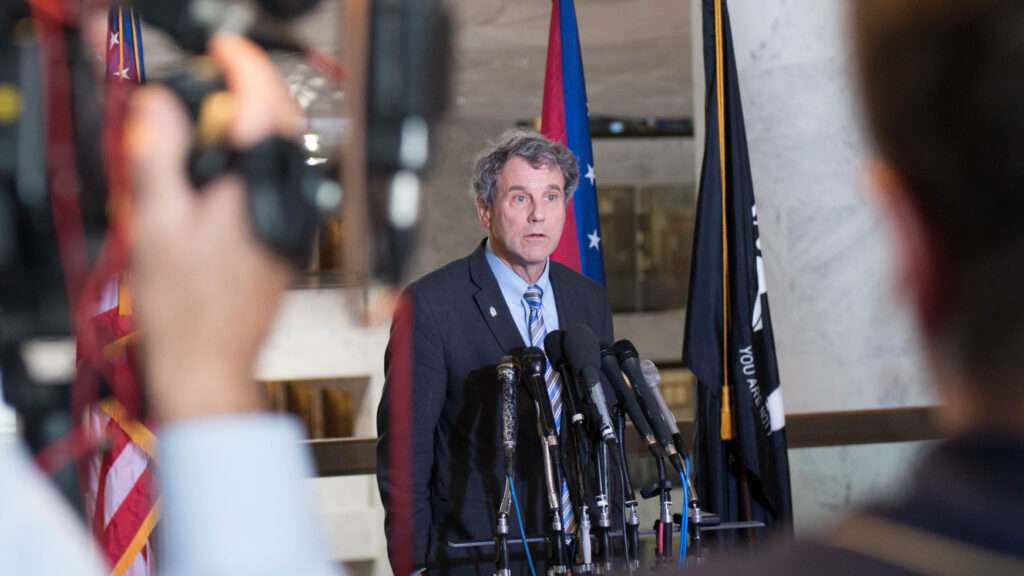Despite USMCA being the “gold standard” trade agreement, Mexican trade problems are increasing with the U.S. The Senate Finance Committee on Wednesday brought up the surge of Mexico steel imports into the United States, in breach of a 2019 joint statement. Some are calling for steel tariffs now. Mexico is preparing to retaliate.
Sen. Sherrod Brown (D-OH) took the lead in Wednesday’s hearing, saying Mexican companies are selling steel conduit above the 2019 agreement’s limits.
“We have steel conduit coming into the country in record numbers and so we need to hold Mexico accountable to protect American steel workers,” Sen. Brown told USTR Katherine Tai. He asked for her support.
“That is very easy for me to commit to,” Tai told him. She said she was talking to her Mexican counterparts and left it at that.
Sen. Jim Lankford (R-OK) said steel products were being “dumped” in Oklahoma, but did not say from where.
Sen. Debbie Stabenow (D-MI) missed an opportunity to call out Mexico in this week’s hearing, too. The country is fast becoming a replacement to Michigan for automotive assembly. GM has over a billion dollars invested there since 2021. Ford only makes the traditional Mustang in the U.S., all other sedans, including the Mach-E Mustang, are now made in Mexico and have been since 2016.
Instead, Stabenow focused on China EVs. She supported the Biden administration’s idea to impose tariffs on them. Chinese cars already have tariffs, if coming in from China. But they are increasingly being built in Mexico, just like American, German, Japanese and Korean automobiles, and will one day come into the U.S. duty free.
Washington seems to be setting the table for tariffs on Mexico-made Chinese car brands only, basing it on the idea that the automobile sector is subsidized back home.
“The Chinese government’s heavy subsidies for automakers are a significant threat to us,” Stabenow said. “And to our national security, I would add. Allowing lower priced EVs to come into the U.S. would cost us thousands of jobs and would short change our goal of making sure American EVs are made by American EV workers. It’s essential that we protect American businesses, and our workers,” she said.
“Michigan is one of the best examples as to why we need a different trade policy,” Tai responded. “It has agriculture and it is important to American industry. EVs are a part of a larger pattern we have seen before. We saw it first with solar panels. We had a growing industry and an innovative industry that got washed out by these same practices,” she said.
“China’s enormous state support for industry fosters overcapacity that brings prices down so low, no one can compete and we are going through this again with autos and EVs. We have to take action,” Tai told the Senate Finance Committee on Wednesday. “If not, we are going to lose the capacity to produce things and once you lose that, it’s hard to rebuild it. We have to act fast. Free trade is a beautiful concept, but the world economy is not characterized by free trade. That’s a dream.”
Sen. Thom Tillis (R-NC) talked up a Brown bill he supports called the Fighting Trade Cheats Act (S. 805), that makes it easier for private companies and attorneys to go after foreign companies. He mentioned CPA member Charlotte Pipe and their case against Chinese IP theft. “I think they can be used as an example to get the private sector and private sector lawyers to go after trade cheats,” Tillis said.
Senator Brown sits in one of the few states that stands in the cross hairs of all of the hot trade issues of the day – from agriculture and steel, to cars and solar.
He told Tai to keep the Trump-era 301 tariffs in place “and increase them when necessary in areas like solar products and steel.”
He asked her what the USTR can do to stand up to China and protect U.S. manufacturing jobs, “especially in solar and steel.”
“At USTR, we have a lot of tools, obviously section 301 is one of them,” she said. “We have a lot of tariffs deployed now, or in the process of finalizing and assessing how those tariffs can be more effectively or strategically deployed. They are part of a goal to more strategically and effectively build counter measures to unfair practices that harm our industries and workers. On solar, we have authorities under section 201 tariffs and we have been looking at how we can bring them to bear in order to address this challenge of revitalizing an industry that we lost because of the inability to compete with those advantages from China. We are looking at all of our options,” she said.
On the day of the Senate Finance Committee hearing with Tai, Reuters reported that the Biden administration is expected to reverse a two-year-old exemption on bifacial solar panels that has allowed imports of solar used by large scale utilities to come in at low tariff rates. This exemption harmed numerous companies that wanted to tap this market, a market made possible by the low barrier of entry for Chinese products that are produced at an unmatched scale thanks to the open market provided for them here in the U.S.












